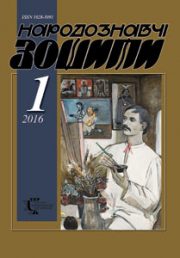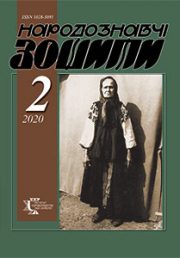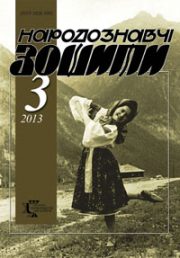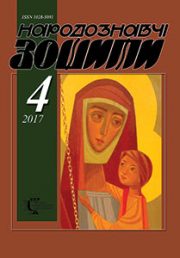The Ethnology Notebooks. 2017, 6 (138), 1336—1342
UDK 398.341 (= 161.2)
DOI https://doi.org/10.15407/nz2017.06.1336
Received 21.11.2017
BUILDER IN DEMONOLOGICAL BELIEFS OF VOLYN REGION INHABITANTS
Siletskyi Roman Bronislavovich, PHD in History, professor,
Head of the Department of Ethnology
of the Ivan Franko National University in Lviv
Universytetska Str. 1, Lviv, 79000, Ukraine
Contacts: Tel. (032) 2394540; e-mail: kaf.etnolog.lnu@gmail.com
Abstract. Basing on field ethnographic materials, recorded by the author in Volyn region at the beginning of the XXI century, was considered the figure of the master builder as a demonological character. Most clearly the demonological characteristics of the masterbuilder («neprostoho») are manifested in the process of housing construction, particularly, at the time of its foundation. According to the widespread prejudice about the danger of the beginning of construction (due to archaic ideas), the master, in order to distract himself from the danger, was supposed to build the house on «someone’s head». Due to his supernatural «magic» actions during the construction depended on the future of life, health and wellbeing of the inhabitants of the new home.
Keywords: demonology, building rituals, Volyn regіon, customs, rites, beliefs.
REFERENCES
Arkhiv LNU. F. R119. Op. 17. Spr. 523E.
Arkhiv LNU. F. R119. Op. 17. Spr. 524E.
Arkhiv LNU. F. R119. Op. 17. Spr. 525E.
Arkhiv LNU. F. R119. Op. 17. Spr. 526E.
Vojtovych, N. (2015). Narodna demonolohiia Bojkivschyny. L’viv : SPOLOM.
Zubryts’kyj, M. (2013). Mity i viruvannia: budynky i majstry. In M. Zubryts’kyj, Zibrani tvory i materialy (Vol. 1, pp. 89—93). L’viv.
Silets’kyj, R. (2003). Majster-budivel’nyk u zvychaiakh ta povir’iakh ukraintsiv. Visnyk L’vivs’koho universytetu, 38, 523—542.
Silets’kyj, R. (2011). Tradytsijna budivel’na obriadovist’ ukraintsiv. L’viv : LNU imeni Ivana Franka.
Fischer, A. (1928). Rusini. Zarys etnografji Rusi. Lwów ; Warszawa ; Kraków.
Kopernicki, I. (1887). Przyczynek do etnografii ludu ruskiego na Wołyniu z materjałów zebranych Z. Rokossowska we wsi Jurkowszczyźnie w pow. Zwiahelskim. Zbiór wiadomości do antropologii krajowej, 11, 130—228.
Rulikowski, E. (1879). Zapiski etnograficzne z Ukrainy. Zbiór wiadomości do antropologii krajowej, 3, 62—166.







